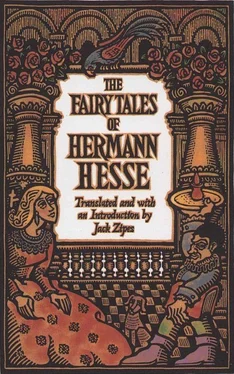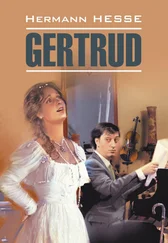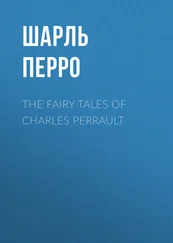Hermann Hesse - The Fairy Tales of Hermann Hesse
Здесь есть возможность читать онлайн «Hermann Hesse - The Fairy Tales of Hermann Hesse» весь текст электронной книги совершенно бесплатно (целиком полную версию без сокращений). В некоторых случаях можно слушать аудио, скачать через торрент в формате fb2 и присутствует краткое содержание. Год выпуска: 1995, ISBN: 1995, Издательство: Bantam Books, Жанр: Классическая проза, Сказка, на английском языке. Описание произведения, (предисловие) а так же отзывы посетителей доступны на портале библиотеки ЛибКат.
- Название:The Fairy Tales of Hermann Hesse
- Автор:
- Издательство:Bantam Books
- Жанр:
- Год:1995
- ISBN:9780553377767
- Рейтинг книги:5 / 5. Голосов: 1
-
Избранное:Добавить в избранное
- Отзывы:
-
Ваша оценка:
- 100
- 1
- 2
- 3
- 4
- 5
The Fairy Tales of Hermann Hesse: краткое содержание, описание и аннотация
Предлагаем к чтению аннотацию, описание, краткое содержание или предисловие (зависит от того, что написал сам автор книги «The Fairy Tales of Hermann Hesse»). Если вы не нашли необходимую информацию о книге — напишите в комментариях, мы постараемся отыскать её.
The Fairy Tales of Hermann Hesse — читать онлайн бесплатно полную книгу (весь текст) целиком
Ниже представлен текст книги, разбитый по страницам. Система сохранения места последней прочитанной страницы, позволяет с удобством читать онлайн бесплатно книгу «The Fairy Tales of Hermann Hesse», без необходимости каждый раз заново искать на чём Вы остановились. Поставьте закладку, и сможете в любой момент перейти на страницу, на которой закончили чтение.
Интервал:
Закладка:
But the tiny winged god of love is a cunning rascal and does not like to lose his prey, especially such a beautiful one. Now as we know from experience, proud and unapproachable women are precisely the ones who fall in love the fastest and with the most passion, just as the warmest and most glorious spring usually follows the hardest winter. So it was with Margherita, who lost her heart to a young cavalier and seafarer during a celebration in the Muranese gardens. He had just returned from the Levant, and his name was Baldassare Morosini. He soon caught Margherita’s attention, and it was apparent that he was just as noble and majestic as she was. Whereas she was light and slender, he was dark and strong, and one could see that he had been on the seas and abroad for a long time and was disposed toward adventure. His thoughts flickered over his tan brow like lightning, and his dark eyes burned intensely and sharply over his aquiline nose.
It was impossible for him not to notice Margherita, and once he learned her name, he immediately arranged to be introduced to her and her father. And indeed, all this transpired with many flattering words and polite gestures. Then he stayed as close to her as propriety allowed until the end of the party, which lasted until midnight, and she listened to his words more eagerly than to the gospel, even when they were addressed to other people and not herself. As you may imagine, Baldassare was asked more about his voyages, deeds, and constant dangers than anything else, and he spoke of them with such decorum and serenity that everyone took great pleasure in listening to him. In reality all his stories were dedicated to one listener only, and she did not let one breath of his words escape her. With such ease did he talk about the strangest adventures that his listeners were led to believe they themselves must have actually experienced them. Nor did he place himself too much in the foreground, as seafarers, especially young ones, are won’t to do. Only one time, when he was recounting a battle with African pirates, did he mention a wound — its scar ran diagonally across his left shoulder — and Margherita held her breath as she listened, fascinated and horrified at the same time.
At the end of the party he accompanied her and her father to their gondola, bade them farewell, and remained standing for a long time, gazing at the torch of the gondola as it glided over the dark lagoon. Only after he completely lost sight of the gondola did he return to his friends in the arbor of a tavern, where the young cavaliers, and also some pretty maids, spent the rest of the warm night drinking yellow Greek wine and sweet red. Among them was Giambattista Gentarini, one of the richest young men of Venice, who enjoyed life to the hilt. He approached Baldassare, touched his arm, and said with a laugh, “I had really hoped that you would tell us tonight about your amorous affairs during your voyages! Now there’s probably no chance of this since the beautiful Cadorin has stolen your heart. But you better know that this beautiful lady is made of stone and has no soul. She’s like one of Giorgione’s paintings. Though you truly can’t find much fault with his women, they’re not made out of flesh and blood. They exist only for our eyes. Seriously, I advise you to keep away from her — or would you like to become the laughingstock of the Cadorinian family and the third to be rejected?”
In response, Baldassare only laughed and did not feel compelled to justify his actions. He emptied a couple of glasses of the sweet, oil-colored Cyprian wine and went home earlier than his friends.
The very next day at the proper hour, he visited old Signore Cadorin in his small pretty palace and sought as best he could to make himself acceptable and to win the father’s favor. In the evening he serenaded Margherita with many singers and musicians and had some success — she stood listening at the window and even appeared for a short time on the balcony. Naturally, the entire city began talking about this right away, and the idlers and scandal-mongers knew of the engagement and the supposed day of the wedding even before Morosini put on his best suit to ask Margherita’s father for her hand. In fact, he spurned the custom of that time, and instead of sending one or two of his friends to present his case, he appeared himself before the father. Soon enough, however, the gossips, who always know it all, could take pleasure in seeing their predictions confirmed.
When Baldassare went to Margherita’s father and expressed his wish to become his son-in-law, Cadorin was, to say the least, most embarrassed.
“By almighty God, my dear young man,” he said imploringly, “I don’t underestimate the honor that your proposal means for my family. Nevertheless, I beg you not to proceed with your plans. It would spare you and me much grief and trouble. You’ve been away from Venice a long time on voyages, so you don’t know how many problems this unfortunate girl has caused me. Indeed, she has recently rejected two honorable proposals without any reason whatsoever. She doesn’t care about love and men. And I confess that I have spoiled her somewhat and am too weak to be severe with her and break her stubbornness.”
Baldassare listened politely, but he did not retract his proposal. On the contrary, he took great pains to soothe the anxious old man and put him in a more cheerful mood. Finally, Signore Cadorin promised to speak to his daughter.
You can surely imagine how the lady responded. To be sure, she raised some minor objections and put on quite a show of arrogance in front of her father, but in her heart she had said yes even before she was asked. Immediately after he received her answer, Baldassare appeared with a delicate and valuable gift, placed a gold wedding ring on the finger of his fiancée, and kissed her beautiful proud lips for the first time.
Now the Venetians had something to gaze at, to talk about, and to envy. No one could remember ever seeing such a magnificent couple. Both were tall and had fine figures. The young lady was barely a hair’s breadth smaller than he was. She was blond; he was dark; and both held their heads high and free. Indeed, when it came to a noble and superior bearing, they could compete with the best.
But one thing did not please the splendid bride, and it occurred when Baldassare told her that he would soon have to travel to Cyprus again in order to conclude some important business. The wedding was to take place upon his return. The entire city was looking forward to it already, as though it were a public celebration. In the meantime the couple enjoyed their happiness without much disturbance. Baldassare missed no opportunity to organize events for her, to give her gifts, to serenade her, and to bring about surprises, and he was with Margherita as often as possible. They even took some discreet rides together in a covered gondola, though this was strictly forbidden.
If Margherita was supercilious and a little bit cruel, it was not surprising given the fact that she was a spoiled young aristocratic lady. She was matched, however, by her bridegroom, who was basically arrogant and not used to being considerate toward others. Nor had his work as a sea merchant and his early successes in life made him any gentler. Though he had courted Margherita arduously as a pleasant and demure young man, his true character and ambitions surfaced only after he had attained his goal. Naturally impulsive and overbearing, as seafarer and rich merchant he had become completely accustomed to fulfilling his own desires and to not caring about other people. Right from the beginning it was strange how repulsive he found many of the things that surrounded his bride, especially the parrot, the little dog Fino, and the dwarf Filippo. Whenever he saw these three, he became irritated and did everything he could to torture them or to get them away from their mistress. And whenever he entered the house and his strong voice could be heard on the winding stairs, the little dog howled and fled and the parrot cried and flapped its wings. The dwarf contented himself with withdrawing and remaining stubbornly quiet. To be just, I must say that Margherita put in many a good word, if not for the animals then certainly for Filippo, and she sometimes tried to defend the poor dwarf. Of course, she did not dare to offend her lover and could not or would not prevent many small torturous and cruel acts.
Читать дальшеИнтервал:
Закладка:
Похожие книги на «The Fairy Tales of Hermann Hesse»
Представляем Вашему вниманию похожие книги на «The Fairy Tales of Hermann Hesse» списком для выбора. Мы отобрали схожую по названию и смыслу литературу в надежде предоставить читателям больше вариантов отыскать новые, интересные, ещё непрочитанные произведения.
Обсуждение, отзывы о книге «The Fairy Tales of Hermann Hesse» и просто собственные мнения читателей. Оставьте ваши комментарии, напишите, что Вы думаете о произведении, его смысле или главных героях. Укажите что конкретно понравилось, а что нет, и почему Вы так считаете.












